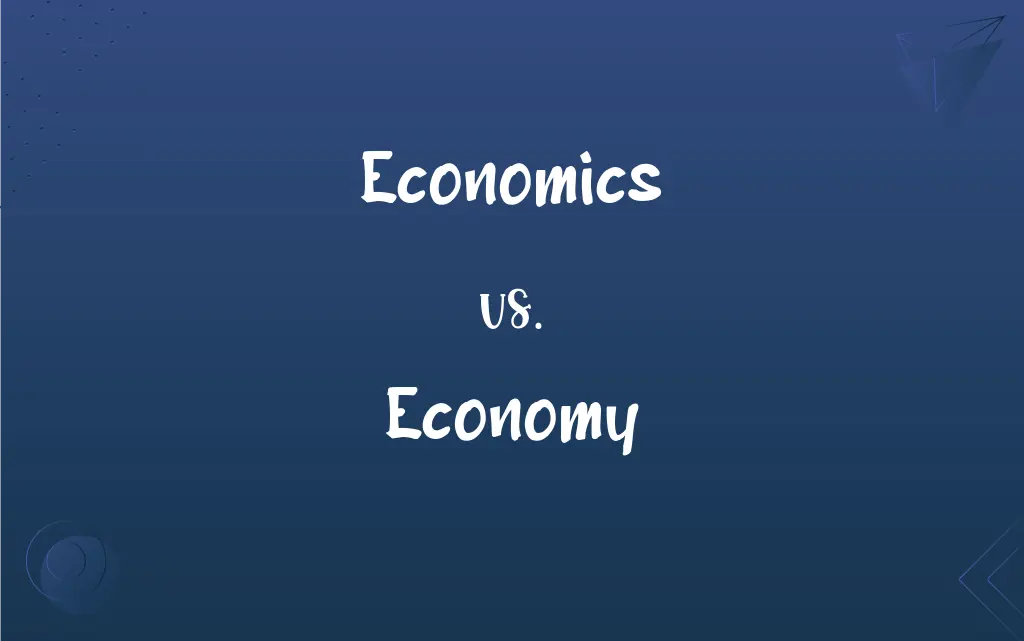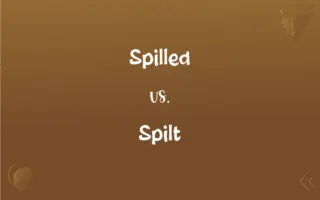Economics vs. Economy: What's the Difference?
Edited by Aimie Carlson || By Janet White || Published on November 4, 2023
Economics is the study of how resources are allocated, while the economy refers to a region's system of production, distribution, and consumption of goods and services.

Key Differences
Economics is a social science that delves into how individuals, organizations, and nations allocate resources. It explores the principles and theories guiding decision-making processes when resources are scarce. Conversely, the term "economy" denotes the combined activities related to production, distribution, and consumption within a particular region or country. Essentially, while Economics provides the framework and theories, the economy is the practical application of these theories in real-world scenarios.
In Economics, scholars seek to understand and explain behavioral patterns, formulate theories, and derive principles that govern resource allocation. Topics in Economics might include supply and demand, inflation, or market structures. The economy, on the other hand, is a tangible entity, often defined by metrics like Gross Domestic Product (GDP), unemployment rates, or trade balances. When someone speaks of a booming or recessive economy, they are referring to the state of these metrics within a particular region.
Economics can be split into multiple branches, including microeconomics, which focuses on individual agents and markets, and macroeconomics, which addresses issues on a larger scale, such as national economies. The term "economy" encapsulates the totality of these economic activities, from individual transactions at local stores to vast international trade deals.
Another perspective is that Economics equips individuals with tools and models to analyze, predict, and perhaps influence economic outcomes. These tools can be used to advise policymakers, businesses, or individuals on optimal decisions. In contrast, the economy is the grand stage where the decisions made, influenced by economic theories, play out, impacting everyone involved.
Economics often deals with hypothetical situations and theoretical constructs to understand fundamental truths about human behavior and resource allocation. The economy, however, is the real-world manifestation of these behaviors and decisions, a constantly evolving entity influenced by countless internal and external factors.
ADVERTISEMENT
Comparison Chart
Definition
Study of resource allocation
System of production, distribution, consumption
Nature
Theoretical
Practical
Scope
Broad (includes various theories)
Specific (related to a region or country)
Application
Provides analytical tools and models
Reflects real-world economic activities
Representation
Conceptual framework
Tangible metrics like GDP, unemployment rates
ADVERTISEMENT
Economics and Economy Definitions
Economics
Framework for understanding financial behaviors and outcomes.
The principles of Economics are crucial for policymakers.
Economy
The collective financial activities within a geographical area.
The global economy faced challenges during the pandemic.
Economics
The study of resource allocation and decision-making.
Through Economics, we learn the implications of supply and demand.
Economy
The state of wealth and resources of a country or region.
The health of the economy is often gauged by its GDP.
Economics
A science exploring how societies manage scarcity.
Economics can provide insights into addressing inflation.
Economy
Careful, thrifty management of resources, such as money, materials, or labor
Learned to practice economy in making out the household budget.
Economics
The discipline analyzing production, distribution, and consumption.
Environmental Economics focuses on the relationship between the environment and economic activities.
Economy
An example or result of such management; a saving.
Economics
Investigation of principles guiding financial choices.
Behavioral Economics examines the psychological aspects behind consumer decisions.
Economy
The system or range of economic activity in a country, region, or community
Effects of inflation were felt at every level of the economy.
Economics
(used with a sing. verb) The social science that deals with the production, distribution, and consumption of goods and services and with the theory and management of economies or economic systems.
Economy
A specific type of economic system
An industrial economy.
A planned economy.
Economics
(used with a sing. or pl. verb) Economic matters, especially relevant financial considerations
"Economics are slowly killing the family farm" (Christian Science Monitor).
Economy
An orderly, functional arrangement of parts; an organized system
"the sense that there is a moral economy in the world, that good is rewarded and evil is punished" (George F. Will).
Economics
(social sciences) The study of resource allocation, distribution and consumption; of capital and investment; and of management of the factors of production.
Mary studied economics for 5 years before going into banking.
Economy
Efficient, sparing, or conservative use
Wrote with an economy of language.
Economics
The science of household affairs, or of domestic management.
Economy
The least expensive class of accommodations, especially on a commercial conveyance, such as an airplane.
Economics
Political economy; the science of the utilities or the useful application of wealth or material resources; the study of the production, distribution, and consumption of goods and services of a nation or region, and its effect on the wealth of a country. See Political economy, under Political.
Economy
(Theology) The method of God's government of and activity within the world.
Economics
The branch of social science that deals with the production and distribution and consumption of goods and services and their management
Economy
Economical or inexpensive to buy or use
An economy car.
An economy motel.
Economy
Effective management of a community or system, or especially its resources.
Economy
The regular operation of nature in the generation, nutrition and preservation of animals or plants.
Animal economy, vegetable economy
Economy
System of management; general regulation and disposition of the affairs of a state or nation, or of any department of government.
Economy
A system of rules, regulations, rites and ceremonies.
The Jewish economy
Economy
The disposition or arrangement of any work.
The economy of a poem
Economy
The study of money, currency and trade, and the efficient use of resources.
Economy
Frugal use of resources.
Economy of word
Economy
The system of production and distribution and consumption. The overall measure of a currency system; as the national economy.
Economy
(theology) The method of divine government of the world. (See w:Economy (religion).)
Economy
(US) The part of a commercial passenger airplane or train reserved for those paying the lower standard fares; economy class.
Economy
(archaic) Management of one’s residency.
Economy
Cheap to run; using minimal resources; representing good value for money; economical.
He bought an economy car.
Economy size.
Economy
(US) In or via the part of a commercial passenger airplane reserved for those paying the lower standard fares.
Economy
The management of domestic affairs; the regulation and government of household matters; especially as they concern expense or disbursement; as, a careful economy.
Himself busy in charge of the household economies.
Economy
Orderly arrangement and management of the internal affairs of a state or of any establishment kept up by production and consumption; esp., such management as directly concerns wealth; as, political economy.
Economy
The system of rules and regulations by which anything is managed; orderly system of regulating the distribution and uses of parts, conceived as the result of wise and economical adaptation in the author, whether human or divine; as, the animal or vegetable economy; the economy of a poem; the Jewish economy.
The position which they [the verb and adjective] hold in the general economy of language.
In the Greek poets, as also in Plautus, we shall see the economy . . . of poems better observed than in Terence.
The Jews already had a Sabbath, which, as citizens and subjects of that economy, they were obliged to keep.
Economy
Thrifty and frugal housekeeping; management without loss or waste; frugality in expenditure; prudence and disposition to save; as, a housekeeper accustomed to economy but not to parsimony.
I have no other notion of economy than that it is the parent to liberty and ease.
The father was more given to frugality, and the son to riotousness [luxuriousness].
Economy
The system of production and distribution and consumption
Economy
The efficient use of resources;
Economy of effort
Economy
Frugality in the expenditure of money or resources;
The Scots are famous for their economy
Economy
An act of economizing; reduction in cost;
It was a small economy to walk to work every day
There was a saving of 50 cents
Economy
A region's system of producing, distributing, and consuming goods and services.
The US economy is one of the largest in the world.
Economy
A structured network of trade, industry, and finance in a region.
The local economy thrived due to tourism.
Economy
An entity reflecting the economic health and activities of an area.
The digital revolution greatly impacted the modern economy.
FAQs
What is the main objective of Economics?
Economics aims to understand and explain how resources are allocated and decisions are made.
How is the economy typically measured?
The economy is often measured by metrics like GDP, unemployment rates, and inflation.
Why is the state of the economy important to common citizens?
The state of the economy affects job availability, purchasing power, and overall quality of life.
Are there different branches within Economics?
Yes, including microeconomics, macroeconomics, behavioral economics, and many more.
Can you give an example of an economic activity within an economy?
Purchasing groceries, exporting goods, and real estate investment are all economic activities within an economy.
How does technology advancement influence the economy?
Technological advancements can boost productivity, create new industries, and transform existing ones, influencing the economy.
Is Economics only about money?
No, Economics also studies behavior, resource allocation, and societal outcomes, not just monetary aspects.
Can Economics predict future economic crises?
While Economics provides tools for analysis and forecasting, it can't always predict exact timings or magnitudes of future crises.
How does Economics influence policymaking?
Economics provides analytical tools and theories that guide policy decisions to impact the broader economy.
How do wars or natural disasters affect an economy?
They can disrupt production, trade, and cause infrastructure damage, impacting the economy's overall health.
What are the foundational principles in Economics?
Principles like supply and demand, opportunity cost, and marginal utility are foundational in Economics.
What roles do governments play in the economy?
Governments can regulate, tax, spend, and set monetary policy
About Author
Written by
Janet WhiteJanet White has been an esteemed writer and blogger for Difference Wiki. Holding a Master's degree in Science and Medical Journalism from the prestigious Boston University, she has consistently demonstrated her expertise and passion for her field. When she's not immersed in her work, Janet relishes her time exercising, delving into a good book, and cherishing moments with friends and family.
Edited by
Aimie CarlsonAimie Carlson, holding a master's degree in English literature, is a fervent English language enthusiast. She lends her writing talents to Difference Wiki, a prominent website that specializes in comparisons, offering readers insightful analyses that both captivate and inform.






































































